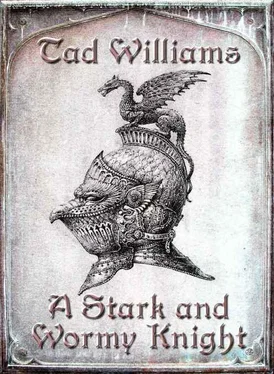Tad Williams - A Stark And Wormy Knight
Здесь есть возможность читать онлайн «Tad Williams - A Stark And Wormy Knight» весь текст электронной книги совершенно бесплатно (целиком полную версию без сокращений). В некоторых случаях можно слушать аудио, скачать через торрент в формате fb2 и присутствует краткое содержание. Жанр: Фантастика и фэнтези, на английском языке. Описание произведения, (предисловие) а так же отзывы посетителей доступны на портале библиотеки ЛибКат.
- Название:A Stark And Wormy Knight
- Автор:
- Жанр:
- Год:неизвестен
- ISBN:нет данных
- Рейтинг книги:3 / 5. Голосов: 1
-
Избранное:Добавить в избранное
- Отзывы:
-
Ваша оценка:
- 60
- 1
- 2
- 3
- 4
- 5
A Stark And Wormy Knight: краткое содержание, описание и аннотация
Предлагаем к чтению аннотацию, описание, краткое содержание или предисловие (зависит от того, что написал сам автор книги «A Stark And Wormy Knight»). Если вы не нашли необходимую информацию о книге — напишите в комментариях, мы постараемся отыскать её.
A Stark And Wormy Knight — читать онлайн бесплатно полную книгу (весь текст) целиком
Ниже представлен текст книги, разбитый по страницам. Система сохранения места последней прочитанной страницы, позволяет с удобством читать онлайн бесплатно книгу «A Stark And Wormy Knight», без необходимости каждый раз заново искать на чём Вы остановились. Поставьте закладку, и сможете в любой момент перейти на страницу, на которой закончили чтение.
Интервал:
Закладка:
Tobias now examined the big man with unhidden interest — if he had no wits, it couldn’t be rude to stare, could it? “What happened?”
“The roof fell on him.” Feliks took the fish from the stick, burning his fingers so that he almost dropped it — Tobias was amused by how many things the man didn’t know how to do — and then cut it into two pieces with a knife, handing the larger piece to the silent giant. Eli moved for the first time; he took fish without looking at it, put it in his mouth, and chewed with bovine patience. Feliks began to eat the other piece, then turned shamefacedly to Tobias. “I should offer some to you, for your kindness.”
Tobias was old enough to understand this would not be a small sacrifice for Feliks. “No, I’ll eat at home. And I’d better go now or Father will have the strap out.” He looked through the trees to the angle of the sun, which was definitely lower than he would have liked. “He’ll have the strap out, anyway.” The boy stood. “I’ll come back tomorrow, though. I can help you catch better fish than that one.” He hesitated. “Have you been to other places? Other villages, even towns?”
Feliks nodded slowly. “Many places. Many cities all over the Middle Lands.”
“Cities!” Tobias swayed a little, faint-headed at the thought. “Real cities? I’ll be back!”
The tall man named Eli suddenly put out his hand, a gesture so startling after his hour of near-immobility that Tobias recoiled as though from a snake.
“He…I think he wants to thank you,” Feliks said. “Go ahead, boy — take his hand. He was a great man once.”
Tobias slowly extended his own small hand, wondering if this might be the beginning of some cruel or even murderous trick — if he had been too trusting after all. Eli’s hand was big, knob-knuckled and smudged with dirt, and it closed on the boy’s slim fingers like a church door swinging closed.
Then Tobias vanished.
When two days had passed with no sign of the boy, suspicion of course fell on the two strangers living in Squire’s Wood. When the man named Feliks admitted that they had seen the child and spoken to him, the shireward and several local fellows dragged them out of the forest and chained them in wooden stocks beside the well in the center of the village, where everyone could see them and marvel at their infamy. Feliks tearfully continued to insist that they had done nothing to harm the boy, that they did not know where he had gone — both things true, as it turned out — but even if the two men had not been strangers and thus naturally suspect, the villagers could see that the big one was plainly touched, perhaps even demon-possessed, and almost no one felt anything for them but horror and disgust.
The lone exception was Father Bannity, the village priest, who felt that it was a troubling thing to imprison people simply because they were strangers, although he dared not say so aloud. He himself had been a stranger to the village when he had first arrived twenty years earlier (in fact, older villagers still referred to him as “the new priest”) and so he had a certain empathy for those who might find themselves judged harshly simply because their grandfathers and great-grandfathers were not buried in the local churchyard. Also, since in his middle-life he had experienced a crisis of faith, leading him to doubt many of the most famous and popular tenets of his own religion, he was doubly unwilling to assume the guilt of someone else simply because they were not part of the familiar herd. So Father Bannity took it on himself to make sure the two prisoners had enough food and water to survive. It would be a long wait for the King’s Prosecutor General to arrive — his circuit covered at least a dozen villages and lasted a full cycle of the moon — and even if the two were guilty of killing the poor child and hiding his body, Father Bannity did not want them to die before this could be discovered for certain.
As the small man, Feliks, grew to trust him, he at last told Bannity what he swore was the true story of what had happened that day, that the boy had touched big Eli’s hand and then disappeared like a soap bubble popping. Father Bannity was not quite certain what to think, whether this was a true mystery or only the precursor to a confession, a man easing gradually into a guilty admission as into a scalding bath, but he stuck by his resolution to treat them as innocent until they told him otherwise, or events proved the worst to have happened.
One day, as he was holding a ladle of water to Eli’s dry lips, the big man suddenly looked at him almost as if seeing him for the first time, a flash of life in the dull, bestial eyes that Bannity had not seen before. Startled, the priest dropped the ladle. The big man lifted his hand as far as he could with his wrist restrained by the stocks and spread his long fingers like some strange flower blooming.
“Don’t,” whispered Feliks. “That’s what the boy did.”
Father Bannity hesitated for only a moment. Something in the big man’s strange gaze, something solemn and distant but not unkind, convinced him. He reached out and allowed Eli’s hand to fold around his.
For a startling moment Bannity thought he had become a fish, jerked thrashing out of the river and up into the daylight, blinded by the sun and its prismatic colors, dazzled by the burning air. Then, a half-instant later, he realized it was as though he had been out of the water for years, and now had suddenly been plunged back into it: everything that had withered in him suddenly sprang back to life, all the small losses of the passing days and months — color, feeling, ecstasy. The feeling was so strong, so overwhelming, that he could not even answer Feliks’ worried questions as he staggered away.
Bannity knew again. He had forgotten what it felt like, but now he remembered, and the thunderous force of belief returning betrayed how much he had lost. God had sent him a miracle in the person of the silent giant, and with that single touch, a world which had slowly turned gray around him over the years had been kindled back into flaming life.
God was in everything again, just as He had been when Bannity had been a child, when he had been able to imagine nothing better than to serve Him.
God was alive inside him. He had experienced a miracle.
It was only when the first surge of ecstatic happiness had become a little more ordinary, if no less pleasurable, that Father Bannity realized nothing tangible had actually changed. It wasn’t so much that God had shown him a miracle, a sign, it was more as if touching the giant’s hand had reawakened him to the love of God he had once had, but which had slipped away from him.
It was Eli, he realized, although undoubtedly acting as God’s messenger, who had given him back his love of the Lord, his belief in a living Creation, and most of all, his certainty that what was, was meant to be.
The silent, damaged man had given Bannity his heart’s desire, even though the priest himself had not known what it was.
Grateful, renewed, the priest resolved to speak on behalf of the two prisoners when the Prosecutor General returned to the village, to tell the truth even if it meant admitting that he had, for a time, lost his own faith. Father Bannity would undoubtedly have been their only defender, except that on the day before the traveling lawspeaker rode into town, the boy named Tobias came back.
He had been, the boy told the villagers (and very gleefully too) in the town of Eader’s Church, and it was just as big and wonderful as he had imagined. “They have lots of dogs!” he said, his eyes still bright with the spectacle he had seen. “And houses that go up and up! And people!” He seemed to feel that the whipping his father had just given him — on general principles, since the actual mechanics of the boy’s disappearance were still a mystery — was a small price to pay for all he’d seen.
Читать дальшеИнтервал:
Закладка:
Похожие книги на «A Stark And Wormy Knight»
Представляем Вашему вниманию похожие книги на «A Stark And Wormy Knight» списком для выбора. Мы отобрали схожую по названию и смыслу литературу в надежде предоставить читателям больше вариантов отыскать новые, интересные, ещё непрочитанные произведения.
Обсуждение, отзывы о книге «A Stark And Wormy Knight» и просто собственные мнения читателей. Оставьте ваши комментарии, напишите, что Вы думаете о произведении, его смысле или главных героях. Укажите что конкретно понравилось, а что нет, и почему Вы так считаете.











